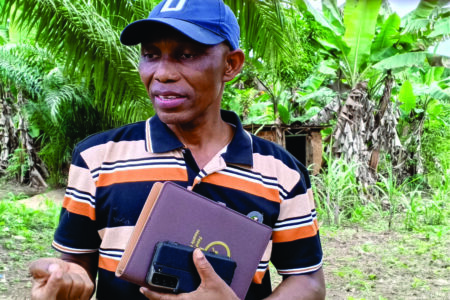By Moses J. Dawoe-Southeastern correspondent
The Ministry of Agriculture’s Project Coordinator for Smallholder Agriculture Development for Food and Nutrition Security (SADFONS), Jlopleh Dennis Wiagbe, has begun touring agricultural projects across Maryland, River Gee, and Grand Gedeh Counties to assess progress and challenges in the sector.
According to Mr. Wiagbe, the government in collaboration with the African Development Bank, the Global Agriculture and Food Security Program of the World Bank, and other stakeholders, is driving an agricultural initiative aimed at boosting productivity.
The program covers approximately 155 hectares of lowland farming in southeastern Liberia.
During the visit, Wiagbe highlighted the strides made by local farmers, particularly in Maryland County, in adopting and expanding lowland farming. Speaking in an interview with the Inquirer on Friday, February 13, 2025, he commended Marylanders for their commitment to agriculture, which he said is helping to place the county on the map as a key contributor to food security.
He further revealed that the Ministry of Agriculture is rehabilitating 155 hectares of farmland for rice production in River Gee, Grand Gedeh, and Maryland counties.
According to him, one of the key projects visited was the Pleebo lowland farming initiative, managed by a local company, Kingdom Business Incorporated.
The company oversees approximately 30 hectares of farmland in Maryland County.
Mr. Wiagbe noted that significant progress has been made, with the successful rehabilitation of the land and farmers are now actively engaged in cultivation.
The SADFONS coordinator also underscored the remarkable achievements of farmers in Blocks A&B, Pleebo Sodoken District.
Their progress, he said, aligns with the ARREST Agenda of President Joseph Boakai, which prioritizes the local production of staple foods such as cassava and other vegetables.
Despite these achievements, Mr. Wiagbe expressed disappointment over the abandonment of certain farming sites, particularly during previous visits by the Minister of Agriculture.
He lamented that after substantial financial support from the government and its partners, some farming areas remained unused.
Looking ahead, he disclosed that the Agriculture Ministry aims to develop 6,000 hectares of farmland nationwide by the end of 2025.
However, he pointed out critical challenges hindering agricultural expansion, including inadequate rehabilitation of farming sites, a shortage of farming tools, and limited access to quality seeds.
He urged farmers to take greater ownership of agricultural activities and not depend solely on government assistance for essential tools such as cutlasses and other farming equipment.
Mr. Wiagbe commended the Mayor of Pleebo City, Larry G. Geekor, for his proactive leadership in supporting local agriculture.
He acknowledged the mayor’s efforts in securing four plots of land within Pleebo’s agricultural block to boost farming activities in the region.
He explained that the Ministry of Agriculture’s ongoing efforts in the southeast reflect Liberia’s broader goal of strengthening food security and promoting self-sufficiency in staple crop production.
Agriculture Coordinator Visits 155 Lowland Farming Projects In Southeast
